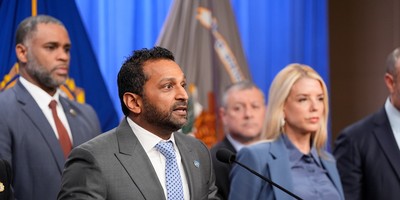Recently, the headlines have read like Woody Allen's 1979 "My Speech to the Graduates": "More than any other time in history, mankind faces a crossroads. One path leads to despair and utter hopelessness. The other, to total extinction. Let us pray we have the wisdom to choose correctly. I speak, by the way, not with any sense of futility, but with a panicky conviction."
Woody Allen, please note, was writing as a comedian.
Of course, surely, with stock markets plunging, cruelly high unemployment and uncertain government (not just in the United States, but around the world) this is not a funny moment.
But then, throughout history few generations have been spared unfunny moments, civilization-threatening dangers and appalling tragedies.
After World War II, America had to face and manage the planet-destroying potential of the atomic bomb -- the handling of which grayed and thinned the hair, raised the blood pressure and haunted the nights of every American president (and Soviet leaders, too).
The rising Japanese economy, double-digit inflation and high unemployment led 1970s Americans to fear the end of American prosperity and dominance. The Dow Jones had hit 1,000 in November of 1972, then slid to almost half -- 577 -- and did not return to 1,000 until 1982, a full decade later. For various reasons -- Nixon and Watergate, of course -- but also including that decade-long, middle-class flatlining of economic hope implied by the Dow Jones average -- all three 1970s presidencies (Nixon, Ford and Carter) ended in failure.
Recommended
The generation before faced the Depression and World War II, the Europeans faced civilizational despair at the near- massacre of a whole generation of their young men in the trenches of World War I.
It is the plight of man constantly to face appalling dangers. It is not necessarily our plight to face such challenges with despair, foolishness and fatalism.
The 1980s and 1990s were decades of prosperity for America. Not coincidentally we were led during those years by presidents (Ronald Reagan and Bill Clinton) who were optimistic -- and knew how to share that optimism, convincingly, with the public.
And, during both those decades, with some heavy Newt Gingrich-led GOP policy wrestling with Clinton in 1993-97, America benefited from sensible, traditional, more or less free-market policies coming out of Washington.
But recently, America has not been blessed with a reliable free market, fiscally sound policy, nor with much sincere, convincing optimism from our most senior Washington leaders -- conspicuously including our president, who seems in recent weeks to have been captured by a sense of exhaustion, futility and helplessness.
He has cited the Japanese earthquake, the "Arab Spring," oil prices and instability in Europe as forces beyond our government's control that are causing our economic troubles.
I would suggest that the Republican candidate for president might want to respond to that with, "Respectfully, Mr. President, if you don't know what to do with the presidency to save our economy, perhaps the office should be turned over to someone who does."
The Republican presidential aspirant who can capture optimism in his or her tone -- while realistically describing how traditional American economic policies can regain prosperity for us -- is likely to win both the nomination and the presidency.
Notwithstanding our current troubles, the underlying strength of the American workforce and the unmatched technological depth of our economy will be the basis for our resurgence -- when Washington policy once again permits our economy to perform at its full strength.
Of course, the unleashing of our vast, relatively inexpensive carbon energy reserves (coal, oil, gas, shale oil and shale gas) must be the foundation of sustained prosperity because throughout history there is a direct correlation between abundant cheap energy and prosperity.
But beyond nature's blessings efficiently delivered by a once again unshackled, unsubsidized energy industry, Americans bring unprecedented and unmatched brainpower to economic activity.
A Rand study for the Pentagon in 2008, as the Economist described it, found that "America is still the world's science and technology powerhouse. It accounts for 40 percent of total world spending on research and development, and produces 63 percent of the most frequently cited publications. It is home to 30 of the world's leading 40 universities, and employs 70 percent of the world's living Nobel laureates. America produces 38 percent of patented new technologies in the Organization for Economic Cooperation Development, OECD, and employs 37 percent of the OECD's researchers...
"There is little evidence that America is resting on its laurels. Countries such as China and India may be boosting their science and technology muscle faster than America. But they are starting from a low base. America is outperforming Europe and Japan on many performance measures...America's growth rate in patents averaged 6.6 percent a year compared with 5.1 percent for the European Union and 4.1 percent for Japan."
But this has not been a season of looking to our strengths. Rather, we have been obsessing on any perceived weakness -- a season of Chinese gloating and Russian sharking at our temporary faltering. It is time to close our ears to those who have given up on America -- foreign and domestic -- rekindle our optimism, unshackle our strength and get about the business of conquering tomorrow for the U.S.

























Join the conversation as a VIP Member